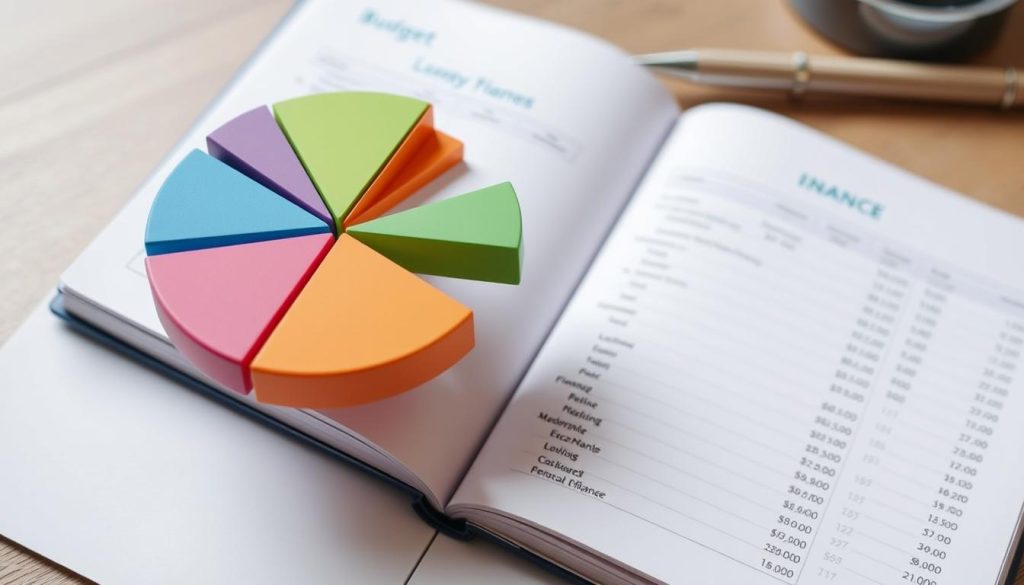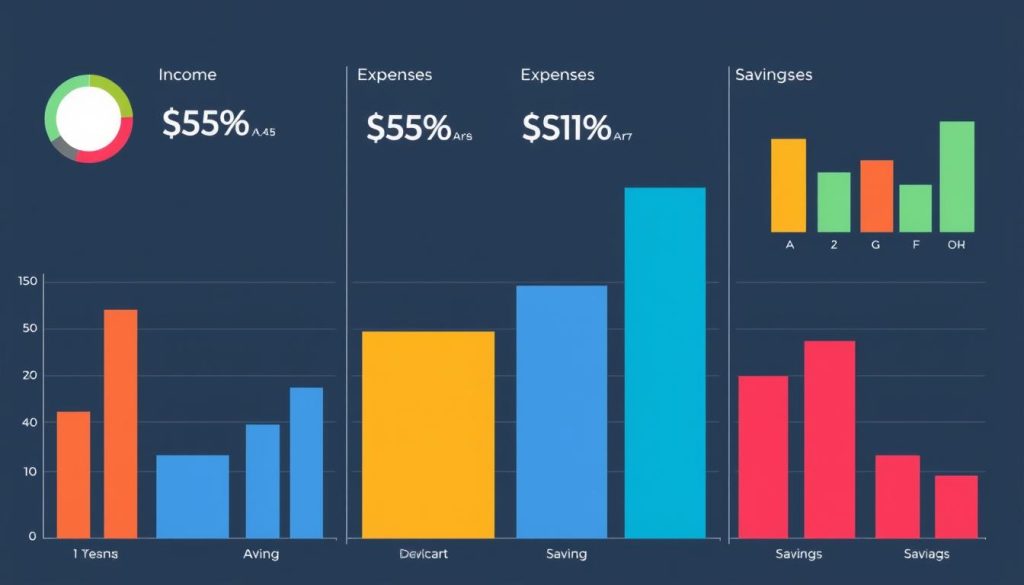Creating a budget is key to financial freedom. It lets me control my money and reach my goals. A budget shows me where my money goes, helping me spend wisely.
With a budget, I can manage my spending better. Knowing my finances helps me make smart choices. It’s not just about saving money, but also spending it well.
By managing my money, I can live a more secure life. A budget helps me use my money effectively. It lets me move closer to my financial dreams and live affordably.
Introduction to Budgeting
Key Takeaways
- Creating a budget helps regain control of finances
- A budget makes it easier to make cost-effective decisions
- Tracking income and expenses is essential for making informed decisions
- A budget helps prioritize spending and allocate resources effectively
- Having a budget in place allows for achieving financial freedom and a more secure life
- A budget is a tool for making the most of your money and achieving financial goals
Why I Started My Journey to Financial Freedom
I realized I needed to change my spending habits. I was living paycheck to paycheck, affecting my mental health. I wanted to make my money last longer, so I looked for economical ways to manage it.
I cut back on inexpensive habits like dining out and unused subscriptions. I also found low-cost alternatives for daily expenses, like free workout routines online. These changes helped me save a lot each month.
My Financial Wake-up Call
I had a wake-up call when I saw my debt pile. I knew I had to act to pay off debts and build savings. I made a budget and tracked my spending to find ways to save more for debt repayment.
The Turning Point in My Money Management
Discovering the need to prioritize spending was a turning point. I learned to tell needs from wants and spent wisely. This shift helped me make big strides in my financial journey, achieving stability.
Understanding Your Current Financial Situation
To make a budget that fits, you need to know your financial state. This means tracking your money coming in and going out. It helps you find where to save and spend better. With a good budget, you can enjoy life without breaking the bank.
Managing money means knowing how you spend it. Tracking your expenses shows where to cut back. Use apps or spreadsheets to keep an eye on your money. This helps you make smart choices and find deals.
- Identify where your money comes from
- Keep track of what you spend
- Set goals that are realistic
- Make a budget that suits you
By following these steps, you’ll get a clearer picture of your finances. Remember, a budget is a tool, not a limit. It helps you manage your money well and find great deals.
The Foundations of a Successful Budget
Creating a budget might seem hard, but it’s key to financial freedom. First, learn about tracking your income and essential expenses. This helps set achievable financial goals and wisely use your money. A budget-friendly approach helps you focus on what’s important and make smart spending choices.
Tracking your income is crucial. Include your salary, investments, and any extra jobs. Use a budgeting app or spreadsheet to keep track. This shows where your money goes and where you can cut back. Being aware of your spending lets you adjust your budget to save more.
Income Tracking Basics
Income tracking is the base of a good budget. Accurately tracking your income ensures you use your money well. The 50/30/20 rule is a good starting point. It suggests 50% for necessary expenses, 30% for fun, and 20% for savings and debt.
Essential Expense Categories
Essential expenses include housing, food, transport, and utilities. These are must-haves and should top your budget. By focusing on these, you can make a budget that suits your needs.
Setting Realistic Financial Goals
Setting financial goals is vital for freedom. Think about both short-term and long-term goals, like paying off debt or saving for retirement. A cost-efficient budget helps you reach these goals and secure your financial future.
- Track your income and expenses
- Prioritize essential expense categories
- Set realistic financial goals
| Category | Percentage of Income |
|---|---|
| Necessary Expenses | 50% |
| Discretionary Spending | 30% |
| Saving and Debt Repayment | 20% |
My Simple Budget Creation System
Creating a budget can seem hard, but it’s not. My system is affordable and economical, making it simple for anyone to start. First, track your income and expenses. This shows where your money goes.
Then, sort your expenses into needs and wants. This helps you spend wisely. It’s key to a budget that’s both affordable and economical. Focus on the basics to save for what’s important.
My budget system includes:
- Income tracking: Watch all your income, like salary, investments, and side jobs.
- Expense categorization: Group expenses into areas like housing, transportation, and food.
- Goal setting: Set achievable financial goals, like saving for emergencies or paying off debt.
By following these steps, you can make a budget that’s affordable and economical. The main thing is to stay consistent and patient. Adjust as needed. Soon, you’ll reach financial freedom.

Smart Ways to Track Your Budget
Tracking your budget is key to financial freedom. With many options, picking the right one can be tough. I’ve found mixing digital tools with old-school methods works best. This way, I can keep an eye on my spending and tweak my budget as needed.
I use budgeting apps and spreadsheets to track my money in real-time. These tools help me spot where I can save. I also jot down my spending in a notebook or use a budgeting worksheet. This mix gives me a full view of my finances and helps me make smart money choices.
Digital Tools and Apps
- Mint: a free budgeting app that tracks my spending and provides personalized budgeting recommendations
- Personal Capital: a financial management tool that helps me track my income and expenses
- Google Sheets: a spreadsheet program that allows me to create custom budgeting templates
Creating Your Personal Tracking Routine
To start, set your financial goals and track your money for a month. Then, create a budget that fits your life. Use a mix of digital tools and old-school methods to stay on track. Making budget tracking a habit will help you reach financial freedom and live more affordably.
| Tracking Method | Cost | Effectiveness |
|---|---|---|
| Digital Tools | Inexpensive | High |
| Traditional Tracking Methods | Cost-effective | Medium |
| Combination of Both | Inexpensive | High |
Making Your Budget Work in Real Life
To make a budget work, you need to be flexible and adjust to changes. Creating a budget is just the start. The real challenge is sticking to it. To do this, prioritize what you need over what you want and make changes as needed.
For example, if you spend too much on dining out, cut back on that in your budget. Finding affordable prices for what you need is also key. Compare prices, look for discounts, and use sales to stay within your budget. This way, you can enjoy what you want without overspending.
It’s also important to plan for unexpected expenses. This ensures you’re ready for any financial surprises.
Here are some tips to help you stick to your budget:
- Track your expenses regularly to identify areas where you can cut back
- Set realistic financial goals and prioritize them
- Take advantage of digital tools and apps to make budgeting easier
- Review and adjust your budget regularly to ensure it’s working for you

By following these tips and being mindful of your spending, you can make a budget that works for you. Remember, a budget is personal and should fit your unique financial situation and goals. With the right mindset and tools, you can enjoy financial stability.
| Category | Budget Allocation | Actual Spending |
|---|---|---|
| Housing | 30% | 25% |
| Transportation | 20% | 22% |
| Food | 15% | 18% |
Strategies for Cutting Costs Without Sacrificing Lifestyle
My journey to financial freedom has taught me a lot. Cutting costs doesn’t mean giving up on fun. By using simple strategies, I’ve cut my expenses without losing out on what I love. One big thing is being economical with my daily spending. This means making smart choices about where my money goes.
To save money, I’ve started using cost-efficient ways to shop and have fun. For example, I plan my grocery trips, use coupons, and buy in bulk. I also find free or cheap fun, like hiking, reading, or game nights with friends.
Here are some more tips to save money without giving up your lifestyle:
- Cancel subscription services you don’t use
- Negotiate with service providers for better rates
- Use public transport or carpool when you can
By following these tips, I’ve saved money without feeling like I’m missing out. It’s all about finding a balance and being smart with my spending.
Building Your Emergency Fund
Having a budget-friendly emergency fund is key to financial freedom. It acts as a safety net for unexpected costs. This way, you can keep moving towards your financial goals.
To start, aim to save 3-6 months’ worth of living expenses. A smart move is to automate savings transfers. This way, you can set up a separate account for your emergency fund.
Here are some important steps to build your emergency fund:
- Identify your essential expenses like rent, utilities, and food.
- Calculate your monthly expenses to figure out how much to save.
- Use automatic transfers to make saving easier and less likely to be forgotten.
By following these steps, you’ll be ready for any unexpected costs. This will help you stay on track with your financial goals.
Dealing with Financial Setbacks
Managing finances means facing setbacks. Unexpected expenses can happen, and plans can fail. The way to get past these is to learn from mistakes and plan for the unexpected. This helps us stay on track and reach our financial goals.
When facing financial setbacks, it’s crucial to stay calm. Panic can lead to bad decisions and more financial trouble. Take a moment to think, assess the situation, and find affordable solutions. Make a budget for unexpected costs and look for low-cost ways to spend less.
Common budget mistakes include overspending, not saving, and no emergency fund. To avoid these, create a budget that suits you. Try the 50/30/20 rule: 50% for needs, 30% for wants, and 20% for savings and debt.
Being proactive helps us overcome big setbacks. Remember, financial freedom is possible. With the right mindset and strategies, we can reach our goals and live more securely. So, don’t let setbacks stop you. Use them to learn and find low-cost ways to move forward.
Advanced Budget Optimization Techniques
My journey to financial freedom has shown me that budgeting is just the start. To really optimize my finances, I must use smart strategies to cut costs and boost savings. One effective way is to optimize my income by starting a side job or asking for a raise.
Another crucial part of advanced budgeting is minimizing expenses. This means cutting back on things we don’t need, like eating out or paying for subscriptions we don’t use. By choosing cheaper options, like cooking at home or canceling unused subscriptions, I can save more money for savings and paying off debt.
Some smart ways to cut expenses include:
- Using public transport or carpooling to save on fuel
- Buying groceries in bulk to lower food costs
- Canceling unused subscriptions, like gym memberships or streaming services
By applying these cost-effective strategies, I can take my budgeting to the next level.
Remember, advanced budget optimization is about making the most of your money. By using these methods, you can create a budget that fits your needs and helps you reach your financial goals.
Conclusion: Your Path to Financial Freedom Starts Now
Budgeting is the first step to financial freedom. It helps you understand your money, make a budget, and track your spending. This way, you can control your finances and reach your goals.
Creating a budget is a journey, not a quick fix. It takes time and effort to get it right. But the benefits are huge. With discipline and a positive attitude, you can overcome financial struggles and build a strong financial base.
It’s time to start your journey to financial freedom. Use the tools and strategies we’ve talked about. Begin your path to a more secure and fulfilling life. Your journey to financial freedom is unique, so find what works for you. Let’s make your dreams of financial independence come true.


